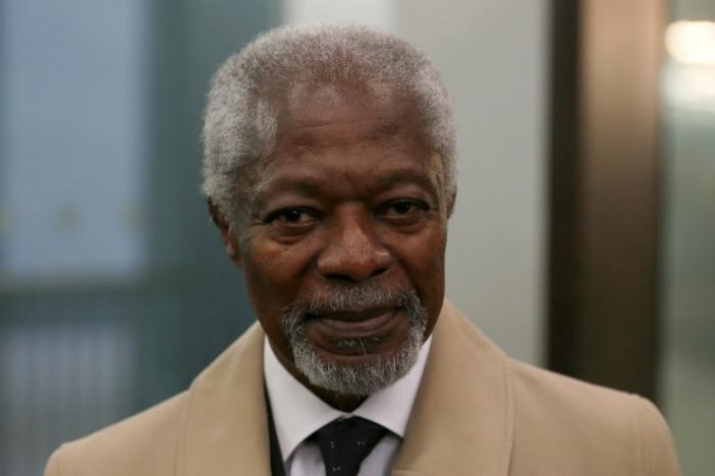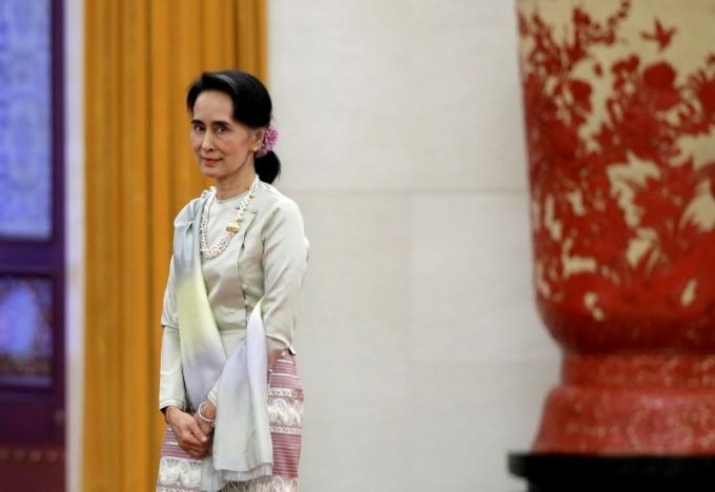NEWS
Myanmar Picks Former UN Chief Kofi Annan to Head Buddhist-Muslim Rakhine Commission
 Former UN secretary-general Kofi Annan will head a nine-member advisory panel tasked with finding solutions to the unrest in Myanmar's Rakhine State. Photo by Stefan Wermuth. From reuters.com
Former UN secretary-general Kofi Annan will head a nine-member advisory panel tasked with finding solutions to the unrest in Myanmar's Rakhine State. Photo by Stefan Wermuth. From reuters.comMyanmar has appointed former United Nations (UN) secretary-general Kofi Annan to head a national-level panel to address human rights abuses in Myanmar’s Rakhine State, where tensions and outbreaks of violence between Buddhists and minority Muslims, who identify ethnically as Rohingya, continue to cast a shadow over the country’s ongoing process of democratic reform.
Religious tensions between Buddhists and Muslims have simmered in Myanmar for almost half a century, but came to a head with violent clashes in 2012 that killed more than 100 people. Rakhine State, one of the country’s poorest, is also one of the most sensitive and conflict-prone regions in Myanmar, particularly since outbreaks of anti-Muslim violence in 2012 and 2013, following which 140,000 people, most of them Rohingya, were displaced. Most remain in squalid resettlement camps, with limited access to education, healthcare, or employment opportunities.
Annan is one of three international figures to be appointed to the nine-person commission announced by Aung San Suu Kyi, Myanmar’s de facto leader, earlier this year and tasked with resolving the unrest in the region. The panel also includes Lebanese politician Ghassan Salamé, who was UN special advisor to Annan from 2003–6, and Dutch diplomat Laetitia van den Assum, who was special advisor to UNAIDS from 2005–6.
Born on the Gold Coast (present-day Ghana) in western Africa in 1938, Annan served as UN secretary-general from 1997–2006. In 2007 he founded the Kofi Annan Foundation, which addresses governance and human rights issues globally.
“The Myanmar government wants to find a sustainable solution on the complicated issues in Rakhine State, that’s why it has formed an advisory commission,” the government said in a statement released by the office of Suu Kyi. The commission is tasked with submitting recommendations to the government on “conflict prevention, humanitarian assistance, rights and reconciliation, institution-building and promotion of development of Rakhine State.” (Reuters, Myanmar Times)
Suu Kyi is barred from the office of president by a junta-drafted constitution, but oversees the running of the government as state counselor and foreign minister.
The Myanmar members of the panel include two Buddhist Arakanese members—U Win Mra, chairperson of Myanmar’s National Human Rights Commission, and Daw Saw Khin Tint, head of the Arakan Literature and Cultural Association and vice-chairperson of the Arakan Women’s Association— and two Muslim members—Al Haj U Aye Lwin, founder of interfaith group Religions for Peace, and U Khin Maung Lay, a member of the National Human Rights Commission. The commission also includes two government representatives, Dr. Thar Hla Shwe, president of Myanmar’s Red Cross Society, and Dr. Mya Thida, president of the Obstetrical and Gynecological Society of Burma.
“We’ll work as a channel, conveying the voices of the affected communities on the ground. Without their involvement, we can’t work,” said U Aye Lwin. “Our commission won’t conceal the truth,” (The Irrawaddy)
 The new commission appears to be the most credible attempt so far by State Counselor Aung San Suu Kyi to address the long-standing human rights violations in Rakhine State. Photo by Jason Lee. From reuters.com
The new commission appears to be the most credible attempt so far by State Counselor Aung San Suu Kyi to address the long-standing human rights violations in Rakhine State. Photo by Jason Lee. From reuters.comMyanmar classifies Rohingya Muslims as stateless foreign migrants even though they have lived in Myanmar for generations. The country’s population also includes Muslims from other ethnic groups. According to the Washington, DC-based Pew Research Center, Buddhists make up about 80 per cent of Myanmar’s population of some 52 million, and Muslims just 4 per cent. The radical nationalist Committee for the Protection of Nationality and Religion (Ma Ba Tha), a collective of hardline Buddhist abbots and influential monks founded in 2013, has previously stoked religious division, asserting that Myanmar’s Buddhist population and culture is under threat from Islam. More recently, major figures from Myanmar’s mainstream political and religious communities have publically spoken out against Ma Ba Tha, saying the group’s policies are not representative of the country’s Buddhist sangha, which has some 250,000 members according to a government estimate, and do not reflect the essence of Buddhism.
See more
Former UN Chief Kofi Annan to Head New Commission on Arakan State (The Irrawaddy)
Former UN chief tipped to lead Rakhine commission (Myanmar Times)
Former UN Sec-Gen to lead Rakhine committee (Frontier Myanmar)
Myanmar's Suu Kyi picks ex-UN head Annan to lead Rakhine State team (Reuters)
Related
Myanmar to Form Buddhist-Muslim Commission to Address Humanitarian Crisis in Rakhine State (Buddhistdoor Global)
Buddhistdoor View: Reconciling Nationalism and Buddhism (Buddhistdoor Global)
Aung San Suu Kyi to Lead Peace Effort in Rakhine Against Backdrop of Political Complications (Buddhistdoor Global)
Top Buddhist Authority in Myanmar Begins Moving Against Extremist Buddhist Organizations (Buddhistdoor Global)
Lone Buddhist Reaches Out to Rohingya Children in Myanmar (Buddhistdoor Global)
Aung San Suu Kyi Urges Tolerance and Unity in Myanmar’s Troubled Rakhine State (Buddhistdoor Global)














